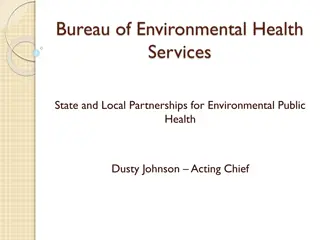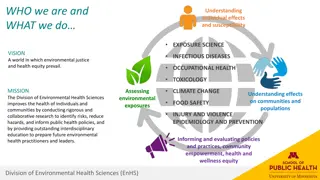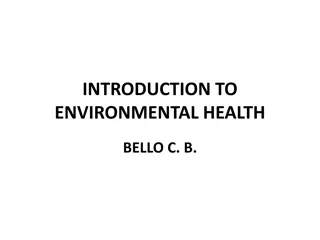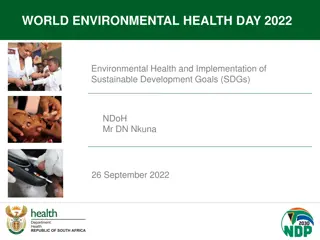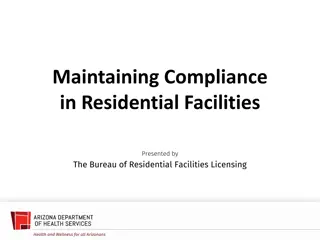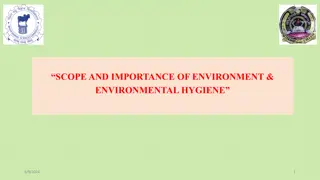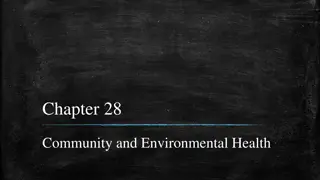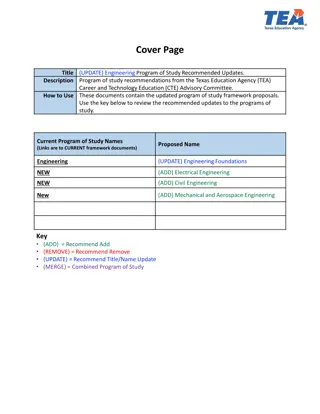
COVID-19 and Effective Prevention Measures
This presentation by Ikpeama John Chiemeziem explores the basics of COVID-19, its symptoms, and ways to tackle the virus effectively. It covers the importance of adequate power supply, waste management strategies, and water treatment in preventing the spread of the disease. By understanding the key aspects highlighted in this presentation, individuals can protect themselves and others during the ongoing pandemic.
Download Presentation

Please find below an Image/Link to download the presentation.
The content on the website is provided AS IS for your information and personal use only. It may not be sold, licensed, or shared on other websites without obtaining consent from the author. If you encounter any issues during the download, it is possible that the publisher has removed the file from their server.
You are allowed to download the files provided on this website for personal or commercial use, subject to the condition that they are used lawfully. All files are the property of their respective owners.
The content on the website is provided AS IS for your information and personal use only. It may not be sold, licensed, or shared on other websites without obtaining consent from the author.
E N D
Presentation Transcript
A PRESENTATION BY IKPEAMA JOHN CHIEMEZIEM 17/ENG04/031 ELECTRICAL/ELECTRONICS
INTRODUCTION WHAT IS COVID-19 Corona-virus disease (COVID-19) is an infectious disease caused by a new virus. The disease causes respiratory illness (like the flu) with symptoms such as a cough, fever, and in more severe cases, difficulty breathing. You can protect yourself by washing your hands frequently, avoiding touching your face, and avoiding close contact (1 meter or 3 feet) with people who are unwell. It originated from wuhan a city in China and was first detected on the 31st of December 2019. The outbreak was declared a Public Health Emergency of International concern on the 30th of January 2020. Corona-virus disease spreads primarily through contact with an infected/ unwell person(s) when they cough, sneeze or through fecal contamination.
SYMPTOMS OF COVID-19 The symptoms of the virus include; Cough Fever Tiredness Difficulty breathing (respiratory issues ).
WAYS OF TACKLING COVID-19 Adequate Power Supply: In a country like Nigerian where the power supply is too limited, preventing the virus might be a problem. Say for instance a Health Centre or Hospital with victims of the virus who have respiratory issues and depend on ventilators or power-respirators would likely have difficulty breathing when the power- supply is out which could lead to death. In this kind of period, the electricity distribution companies could help in preventing the spread or reduce casualties by sustaining power supply not only in hospitals but homes too.
Waste Management: this involves/ includes the collection, transport and disposal of waste, together with monitoring and regulation of the waste management process. Like many respiratory viruses, including flu, Covid-19 can be spread in tiny droplets released from the nose and mouth of an infected person as they cough, when an infected person coughs or sneezes and by chance uses his/her hands to dispose of household waste the virus would most likely be passed onto the waste bag (maybe in a polythene nylon bag). Where the engineer comes in place i.e. the waste engineer is to educate people/household on the disposal of waste products with hand gloves or hands washing after disposing a waste and also incineration of waste products. They should ensure regular environmental check on landfills.
Water Treatment: this involves the process of improving the quality of water to make it fit/acceptable for a specific end-use. Treating water used by the public could go a long way in helping curb the spread of corona-virus. This can be done by using the following water treatment chemicals; Chlorine. Chlorine dioxide. Muriatic acid. Soda ash or Sodium bicarbonate. Algaecide. The following process involves professionals from some Engineering fields such as the chemical Engineering, Water Engineering, Environmental Engineering and hydraulic Engineering.
Water Treatment: this involves the process of improving the quality of water to make it fit/acceptable for a specific end-use. Treating water used by the public could go a long way in helping curb the spread of corona-virus. This can be done by using the following water treatment chemicals; Chlorine. Chlorine dioxide. Muriatic acid. Soda ash or Sodium bicarbonate. Algaecide. The following process involves professionals from some Engineering fields such as the chemical Engineering, Water Engineering, Environmental Engineering and hydraulic Engineering.
Production of Medical Equipments/Kits: Most hospitals you find nowadays use equipments or devices constructed by Engineers. They go a long way in making medical treatments and diagnoses easy. These Equipments are used in diagnosing patients with this virus. Examples of Engineering produced equipments used in tackling the corona-virus are;
Ventilator: a ventilator is a machine that provides mechanical ventilation by moving breathable air into and out of the lungs, to deliver breaths to a patient who is physically. In cases whereby the victim or carrier of the virus experiences difficulty in breathing, he/she could be assisted by a ventilator to aid in breathing.
Power, air-purifying Respirators (PAPR): this is a type of personal protective equipment used to safeguard a person(s) against contaminated air. The device consist of a respirator in the form of a hood, or full-face mask, which takes ambient air that is contaminated with one or more type of pollutant or pathogens, actively removes(filters) a sufficient proportion of these hazards, and then delivers the clean air to the user s face and/or mouth. This could assist health workers in preventing uncontaminated air from entering the body.
Construction of more hospitals or isolation centres: This can be achieved by putting work force on ground. Due to limited time and rising toll of the virus, hospitals would have increase in patients (those affected by the virus and those without the virus) which could result in low space, inadequate equipment to go round. This is where the engineer comes in, engineers could help build new hospitals, including by designing and manufacturing buildings using offsite construction. This would be very helpful and aid in curbing the spread of the virus.
Always put on your face-mask while in public or Gatherings Put on your gloves if a hand sanitizer is not available
STAY HOME. SAVE LIVES Help stop the spread of Coronavirus 1. STAY home as much as you can 2. KEEP a safe distance 3. WASH hands often 4. COVER your mouth while coughing 5. SICK? Visit your nearest hospital





